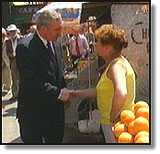
|
Turnout Low in Irish ElectionVoting has finished in the Irish Election. The polls closed at 2200 (BST). Despite a disappointing turnout early in the day there was a late surge in voting this evening, most notably in the working class areas of Dublin. There are no exit polls and counting will not begin until Saturday morning. The full results will not be known until Sunday.2.7 million people were eligible to vote including some 300,000 young first time voters. Despite and early start, with polling station open for fourteen hours, voting proved sluggish with the turnout described as "slow" and "disappointing". Many would-be voters were thought to have been put off by the rain and grey skies that blanketed Ireland for election day. The election was the first in Irish history in which voters faced a cholce between two coalitions, and final polls gave a nine point lead to opposition Fianna Fail- Progressive Democrat Alliance over John Brutons coalition of Fine Gail, the Labour Party, and the Democratic left. Mary Robinson, the Irish president, was one of the first to vote. She visited the polling station at a school near her official residence in Dublin's Phoenix Park within minutes of the polls opening at 8am. Political party leaders in the contest - Prime Minister John Bruton, fellow coalition ministers Dick Spring and Proinsias De Rossa and opposition chiefs Bertie Ahern and Mary Harney - also made appearances at the ballot box at the beginning of fourteen hours of voting. As polling began, Irish bookmakers confirmed opinion poll indications that Mr Bruton and his team could lose the election, rating Mr Ahern's alternative alliance administration the 7-4 on favourites to come out on top. Mr Ahern was also quoted at 3-1 on to be the new prime minister.
Opinion polls predict a big drop in support for the Labour Party of Foreign Minister and Deputy Prime Minister Dick Spring, who has played a major role in the Northern Ireland peace talks. Labour currently holds 30 seats and has held the balance of power in the last two governments.
|
Diana, Princess of Wales, 1961-1997
Conference 97
Devolution
The Archive
News |
Issues |
Background |
Parties |
Analysis |
TV/Radio/Web
Interactive |
Forum |
Live |
About This Site
News |
Issues |
Background |
Parties |
Analysis |
TV/Radio/Web
Interactive |
Forum |
Live |
About This Site
© BBC 1997 |
politics97@bbc.co.uk |

